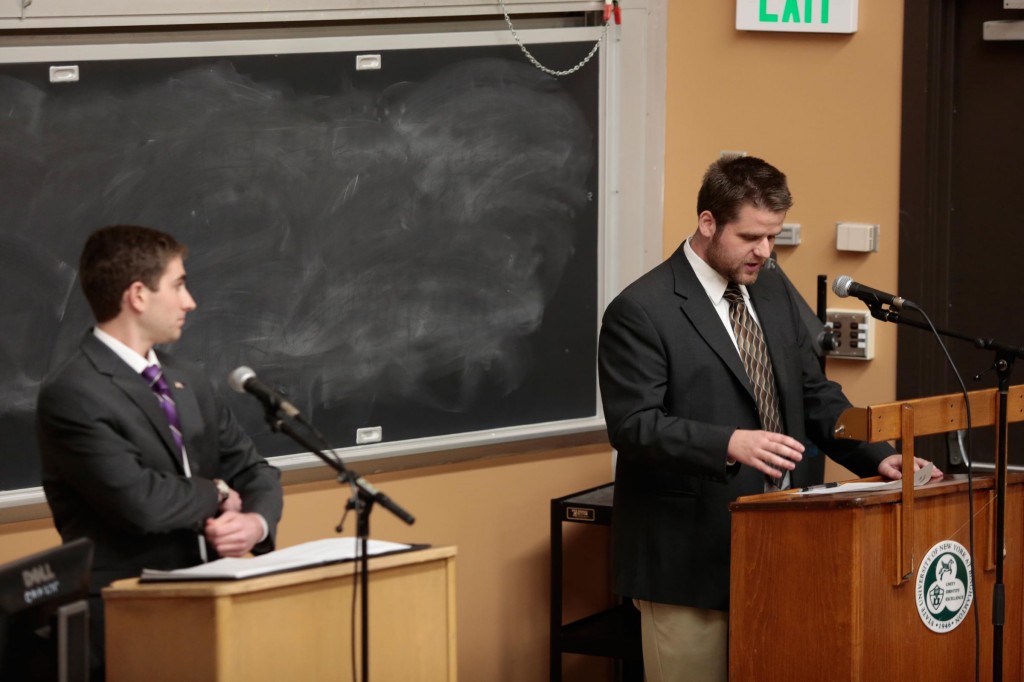The College Democrats and College Republicans clashed in a fierce battle of words during their annual debate Thursday night.
The debate was split into three main parts: domestic, foreign and economic policy. Three representatives from each group took part. Each democrat was paired with a republican to tackle two questions related to their topic.
The debate was moderated by Milton Chester, the assistant dean of students. Despite the election season being over, more than 50 students attended.
They first discussed how active government should be in people’s lives. Nick Fondacaro, a debater for the College Republicans, said it is the federal government’s job not to restrict what people do.
“The government is meant to just protect your life, liberty, property or pursuit of happiness from outside influences,” said Fondacaro, a senior majoring in political science. “We allow people to control what they do with their lives, and we want you to be able to do what you like.”
Jon Mermelstein, a debater for the College Democrats, compared government’s role in people’s lives to the way he offered Foncacaro a tissue before to the debate.
“While conservatives may say, ‘Well, I have my tissue and he should have seen that coming,’ the liberal says, ‘Maybe I won’t have the tissue next time,’” said Mermelstein, a freshman majoring in history. “And it is better off for society to have a culture where we want to help each other and where we want everyone to be able to blow their nose.”
The foreign affairs portion questioned if intervention in Syria should parallel intervention in Libya. David Blair represented the College Democrats on foreign policy, and argued that it must be different.
“The two situations are fundamentally different, and if you get involved in two fundamentally different situations, it’s only logical to say that their outcomes will be fundamentally different,” said Blair, a senior majoring in mathematics.
The concluding segment focused on how to improve the economy and decrease the deficit. Darin Mihalik, president of the College Republicans, debated that government programs should be managed in a way that prevents unnecessary spending.
“At this time in the American economy we need to reform these social programs so they don’t grow out of control and so that we can cut down on spending,” said Mihalik, a sophomore majoring in physics.
Other issues discussed in the debate included the Affordable Healthcare Act, austerity and army spending.
Both organizations considered the debate a success.
“It turned out really well, there were lots of jokes, and all of the debaters did really well.” said Ryan Madden, vice president of the College Democrats and a senior majoring in political science. “We originally planned the debate for before the election, but Sandy happened and we had to move it. Still, we got a really nice turnout.”
Mihalik said the event showed a lasting interest in politics on campus.
“I think it went well,” he said. “We got a really big turnout compared to what we expected. It shows that people are really getting into politics.”
But Derrick Conyers, a junior double-majoring in political science and philosophy, politics and law, said the College Democrats’ performance was lackluster.
“It was clear that the College Republicans won this debate,” Conyers said. “They came out way stronger and seemed more confident. What I found strange was the fact that the war-mongering the Republicans presented was never called out by the Democrats, and I thought they really dropped the ball on that one.”
And Anna Pinchuk, a sophomore majoring in philosophy, politics and law, took issue with the lack of variety in speakers.
“Debate and speech are powerful tools which could be used to improve social justice system and speak against different forms of discrimination,” Pinchuk said. “However, this debate did not live up to its purpose, and was just a tool to exercise public speaking. Props for preparation and bravery, but I hope the next political debate on campus will consist of diverse people who carry bigger messages of social justice to students.”



